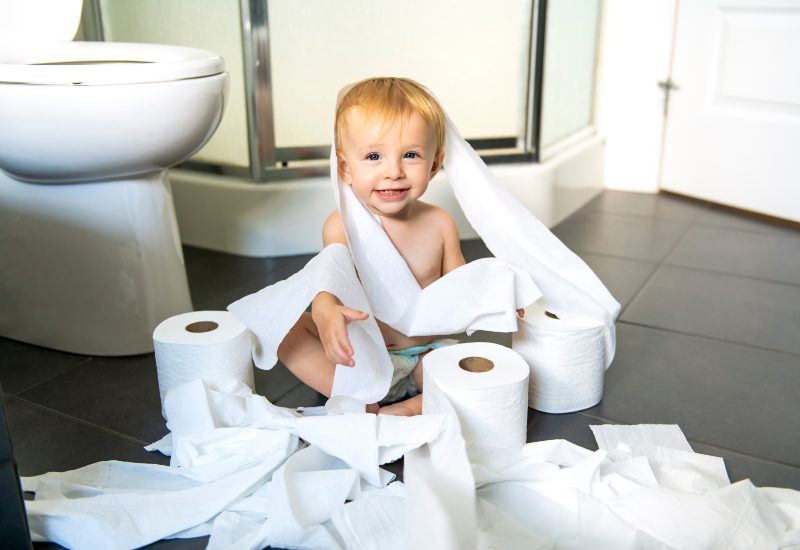
Picture a new mother looking for the perfect wet wipes for her baby. She finds a pack labeled “flushable” and thinks, “How convenient! Then I won’t fill up my trash can so quickly.” But little does she know that despite the label’s promise, flushable wipes aren’t as sewer-friendly as they may seem.
The term “flushable” is somewhat misleading because its use is not regulated, so many companies label their products as such simply because they can. The only guarantee a flushable wipe offers is that it will leave the toilet bowl when flushed—but what happens afterward?
A compelling Canadian study from 2019 tested 101 single-use wipes for flushability, and all failed to fall apart or disperse safely in the water. These results convey a stark reality: including “flushable” on the label is a misleading marketing practice that needs to stop.
Regrettably, most consumers remain unaware that flushing wet wipes poses a significant threat to their drains, sewage treatment plants, and the environment. Learn why you should never flush baby wipes, or anything else besides human waste and toilet paper, and share the reasons with your friends and family!
Wipes Don’t Disintegrate
Toilet paper is specifically designed to dissolve in water. This process begins just minutes into its journey down the sewer line. On the other hand, flushable wipes are fortified with synthetic materials to make them strong. Unfortunately, this strength prevents the wipes from breaking down and makes them more likely to clog your sewer line than regular toilet paper.
Clearing such clogs is no fun. It can take hours, even for a master plumber armed with professional equipment. Soggy clumps of blackened wipes dredged up during the drain cleaning process aren’t a pretty sight. But even less appealing are the sewer backups flushable wipes can cause.
Flushed Wipes Cause the Fatberg Effect
The term “fatberg” refers to solid waste masses that wreak havoc in sewage treatment plants, sometimes costing cities millions of dollars a year to address. These formidable obstructions are comprised primarily of flushable wipes, which bind with cooking oil and grease found in the sewer line, hence the catchy name. Imagine the time and money that could be spent elsewhere if everyone stopped flushing flushable wipes, facial tissues, and other inappropriate toilet paper alternatives.
Wipes are Horrible for Septic Tanks
If you think septic tanks can handle flushable baby wipes better than the municipal sewer system, think again. Flushing wet wipes causes serious blockages in septic tanks, leading to backed-up sinks, drains, and bathtubs. Cleaning up the mess could set you back hundreds or thousands of dollars. In extreme cases, you may even have to replace the entire septic system. Avoid this scenario by keeping wet wipes out of the toilet.
Flushed Wet Wipes Harm the Environment
Beyond the scope of your sewage system, wet wipes can also harm the environment. When heavy rainfall occurs, sewers can overflow, and flushed wipes end up in local rivers. Animals swimming in and drinking from polluted water sources may consume these products, resulting in suffocation or digestive tract obstructions causing starvation.
Protect Your Drains, Sewer, and the Environment
So, how can you contribute to the solution? Explore these practical ways to protect your plumbing and contribute to a cleaner environment:
- Toilet spray: Apply this easy-to-use product directly to a piece of toilet paper to achieve the same cleansing effect as a flushable wipe. Toilet sprays are available in various scents and types, including options for sensitive skin. With a simple spritz, you get the desired freshness without the potential plumbing headache.
- All-purpose cleaners and washcloths: In place of single-use disinfecting wipes, use a quality all-purpose cleaner and reusable cloths. A non-toxic, biodegradable cleaning spray is best. This combination tackles grime and germs without contributing to clogged drains and sewer systems.
- Toss flushable wipes in the trash: If you can’t go without wet wipes, simply toss them in the trash when you’re done rather than flushing them down the toilet. When municipal sewer system workers clear out fatbergs, the contents end up in the landfill anyway, so flushing wipes serves no beneficial purpose.
- Compostable or biodegradable wipes: As the problems associated with flushable wipes become more well-known, some manufacturers are making changes. Check the labels to identify biodegradable and compostable products. These should still not be flushed down the toilet because they take too long to dissolve, but they make great additions to your compost pile. Compostable or biodegradable wipes disintegrate over time without leaving harmful residues, making them better for the environment.
- Bidets or attachments: The European approach is growing more popular in America, with bidets and bidet attachments for existing toilets offering a more sustainable and hygienic solution than wipes. They spray a controlled stream of cleansing water to reduce the need for wiping. Over time, using a bidet can save significant amounts of money on toilet paper and wipes while lessening the load on your septic tank or the municipal sewer system.
- Educate and spread awareness: Knowledge is power. By sharing what you’ve learned about the hazards of flushing wipes and the many suitable alternatives available, you can get more people on board with protecting your community’s pipes, sewage treatment plants, and the environment.
Schedule Plumbing Services in Seattle, WA
At Puget Sound Plumbing and Heating, we’ve seen firsthand the damage that flushable wipes can cause. As a family-owned business with over 20 years of experience, we are committed to delivering exceptional results. Our fully licensed technicians are available 24 hours a day to provide emergency plumbing services when you need us most. To request a visit to your Seattle-area home, please contact us at (206) 938-3219 today.


